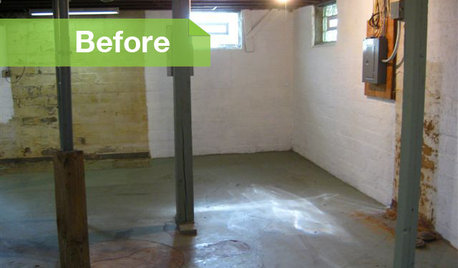Converting to gas from oil heat?
blondelle
16 years ago
Related Stories

INDUSTRIAL STYLEMy Houzz: From Raw Space to Hip Home in a Converted Utah Garage
Creative repurposing with an industrial edge defines the first home of an engaged couple in Salt Lake City
Full Story
LIVING ROOMSHow to Convert Your Wood-Burning Fireplace
Learn about inserts and other options for switching your fireplace from wood to gas or electric
Full Story
REMODELING GUIDESClean-Burning Woodstoves Ignite a Greener Heating Trend
No need to rely on oil or gas to heat your home — new woodstove designs burn cleanly and are beautiful to boot
Full Story
BASEMENTSBasement of the Week: Modern Style Converts an Empty Concrete Box
From raw wasteland to fab living, sleeping and storage space, this snazzy basement now covers all the angles
Full Story
HOUZZ TOURSMy Houzz: Clutter-Free Minimalism for a Converted Brick Storefront
Open and bright, this Salt Lake City home exudes calmness, simplicity and comfort
Full Story
FLOORSFloors Warm Up to Radiant Heat
Toasty toes and money saved are just two benefits of radiant heat under your concrete, wood or tile floors
Full Story
MORE ROOMSMore Living Space: Converting a Garage
5 things to consider when creating new living space in the garage
Full Story
HOUZZ TOURSMy Houzz: Living and Painting in a Converted 1870 Woolen Mill
With a gallery, an art studio and river views, this industrial-style home in Canada is just right for its forward-thinking owners
Full Story
HOUZZ TOURSMy Houzz: Converted Victorian Schoolhouse Looks to the Past
A 19th-century school is transformed into a spacious home with lots of natural light, vintage finds and restored period features
Full Story
FLOORSIs Radiant Heating or Cooling Right for You?
Questions to ask before you go for one of these temperature systems in your floors or walls (yes, walls)
Full StoryMore Discussions






bob_brown
ky114
Related Professionals
Coachella Solar Energy Systems · Glen Ellyn Solar Energy Systems · Lynn Solar Energy Systems · Old Saybrook Solar Energy Systems · Quincy Solar Energy Systems · Shelton Solar Energy Systems · Saratoga Solar Energy Systems · Saratoga Springs Solar Energy Systems · Berkley Home Automation & Home Media · Detroit Home Automation & Home Media · Fairfield Home Automation & Home Media · Park Ridge Home Automation & Home Media · Pittsburgh Home Automation & Home Media · Seattle Home Automation & Home Media · Winchester Home Automation & Home MediablondelleOriginal Author
ky114
boltonranger
ky114
heimert
blondelleOriginal Author
bonanza_stu
Saypoint zone 6 CT
harrybrad